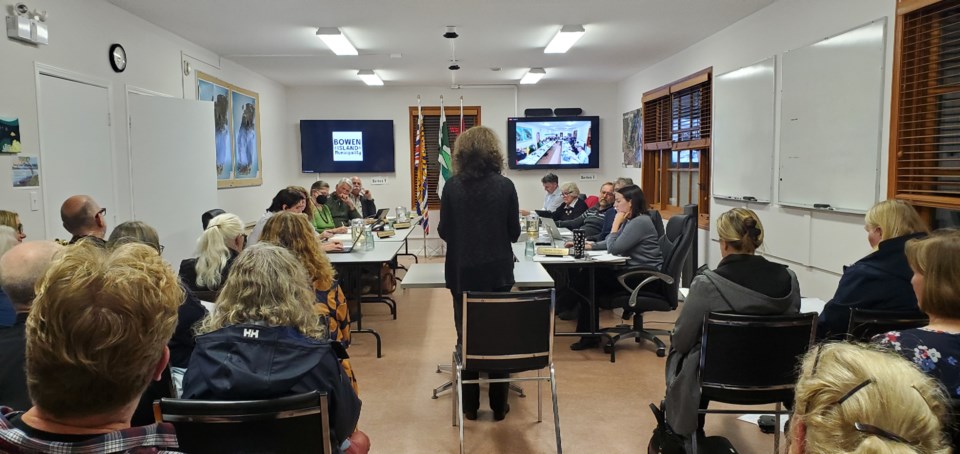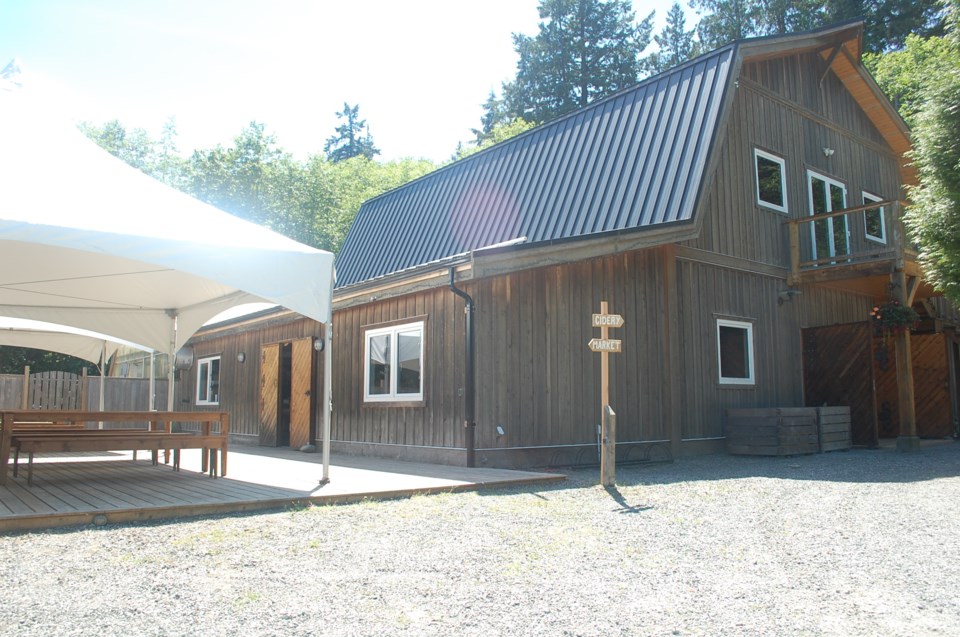If there was any thought the final council meeting of the 2018-22 members may be an uneventful wrap-up, it was quickly put to rest when 30 people filled chambers for Monday night’s standing-room only session.
The hot topic was Bowen Cider House and its plans for expanded operation through a proposed indoor and outdoor lounge. The cidery, which opened its doors in June, has so far been operating a small tasting room with the option for people to purchase cider by the bottle and take it to picnic tables outside.
Now, the Cider House is seeking liquor licencing for a 125 square metre indoor lounge and 117 square metre outdoor patio. Capacity limits would be 167 people inside and 98 outside, for a potential maximum total of 265.
Unlike the cidery decision which stirred up debate on Bowen last year, this discussion wasn’t about whether the cidery could be allowed to operate – provincial zoning of the land as ‘Agricultural Land Reserve’ permits running such a business and the option for a lounge. Rather, it centred around the conditions of lounge operation, as well as the consultation process.
Views toward the changes varied wildly between neighbours located within or outside 300 metres of the Cider House. Inside that radius, feedback consisted of 21 respondents raising concerns, compared to just three in support. Among residents from the rest of the island, the Cider House produced 125 letters of support, with just four against.
Eight of those residents spoke to council during the public comment segment of the Oct. 24 meeting, outlining their various hesitations over the cidery’s plans. “Residents of this mid-island location chose their location because of its bucolic nature… while we appreciate there may be support for the application from other residents of the island, respectfully, they are not primary stakeholders,” said one speaker.
“It is unreasonable to allow any business to operate in such a way that it interferes with the neighbourhood’s use and enjoyment of their land, regardless of how attractive it may be to others,” she continued.
“We should not be the victims of this significant expanded economic development. We need more terms and conditions,” said one neighbour, while another called it a “radical proposal… Does anyone here think they could justify this project to their neighbours in their neighbourhood? If not, then why support it?”
Other comments expressed dismay at the consultation process. “Placing the onus on local residents to launch repeated complaints is a shifting of the responsibility of ensuring no harm on the part of applicants and the municipality… instead it becomes an onerous burden worn by irritated and beleaguered residents to lobby for effective remedial action by the municipality. This is an unacceptable and upside-down approach,” said one speaker, directing her comments at the municipality.

Island community planner Natasha Cheong says the municipality followed the notification guidelines set out by the Liquor and Cannabis Regulation Branch (LCRB), which requires 10 days advance notice before a decision date, in this case the Oct. 24 meeting. Cheong says mailouts were sent to the cidery’s neighbours on Oct. 7.
The in-person speakers supporting the lounge application mostly consisted of members of the Cider House, including cidermaker and operator Alastair Johnstone. “We don’t want to run a pub… we want to run a quiet establishment,” he said, adding there were no plans for “loud amplified music or concerts.”
Johnstone says the cidery’s application took extra steps to consult with neighbours, including sending notice to properties within 300 metres instead of the required 100 metres, and holding an info session on Sunday, which he says nobody attended.
Support also came from owners of a nearby property which hosted weddings over the summer. They said many of the fears about noise from the cidery resulted from a particularly raucous wedding where amplified music carried throughout the region.
“The DJ had a crush on the emcee, so he brought this Coachella-like amplification system (to impress his crush)” explained one of the owners. They said their actions shouldn’t be held against the cidery.
Other concerns raised included parking capacity, as well as increased traffic along winding roads in the area.

Like the public, council deliberations were split. “I was very much struck by the difference between the feedback from those within the 300 metres and those without,” said Coun. Maureen Nicholson. “And I think that tells a story, and it would be unwise for council not to see the difference between the perceived impact on local folks, and people who are not going to be directly affected.”
“I do think this is a really significant change. This is outside the Village,” said Coun. Sue Ellen Fast.
But voluntary changes to operating hours by the applicants went a long way in the application’s favour, particularly surrounding operating hours.
“Darkness and quiet night are critical. And that starts at 9 o’clock, not 10 o’clock (in summer)… I was pleased about the proposed changes,” said Coun. David Hocking, following the adjustment of closing hours to 9 pm at the latest, on Friday and Saturday.
Regarding the 265-person capacity limit, Coun. Michael Kaile said the reality of 27 parking spaces will likely solve this issue. “The actual operation of this – probably to the benefit of everybody in the neighbourhood – is actually going to be… limited by the amount of car parking space available… It’s going to be self-regulating… It’s going to be very seldom that you’re going to get that amount of people in that facility,” said Kaile.
The final list of conditions includes: operating hours of 11 am to 7 pm Sunday to Thursday, and 10 am to 9 pm Friday and Saturday; all patrons must park within the grounds/no off-site parking; no amplified outdoor noise; and the opportunity to apply for a maximum of 10 special events permits in a year, to allow for events like weddings to run outside of the regular business hours.
A Good Neighbour Agreement, similar to the ones established with the Legion or Bowen Lodge, will also be negotiated in the future.
Mayor Gary Ander said this extra agreement will allow the community to “have the conversations that a lot of people say were lacking. And that they have direct input, within reason, from both sides about they require and would like to have… especially the community around.”
With the added conditions council voted 5-2, with Fast and Nicholson in opposition, to endorse the Cider House’s lounge areas to the LCRB.



